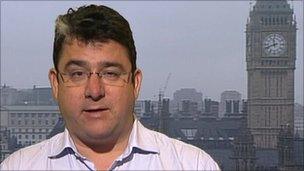Does the public want the death penalty brought back?
- Published

An internet campaign has reignited the debate on whether the UK government should seek the reintroduction of the death penalty.
The Restore Justice campaign, spearheaded by Paul Staines who writes the Guido Fawkes political blog, calls for the death penalty to be brought back for child and police officer murderers.
He cites opinion polls which suggest about half the population would like it re-introduced for murderers. This rises to 60% when it comes to child or police officer killers.
Mr Staines needs 100,000 people to support his e-petition on the government website to prompt a possible parliamentary debate on the issue.
The last executions in the UK took place in 1964. The death penalty was formally abolished in Britain in 1965 and in Northern Ireland in 1973.
Despite it rating high on public opinion polls, it was last debated in Parliament in 1998 during the passage of the Human Rights Act. It was rejected by 158 votes.
"The majority are in favour for bringing back the death penalty everywhere except in Parliament," said Mr Staines.
"Politicians are complaining that there's a disconnect and that the public aren't engaged with them - maybe if they represented the views and the will of the voters, there wouldn't be such a big disconnect."
He added: "The people want the death penalty, and politicians aren't prepared to vote for it. That's not right.
"What I'm trying to do is get Parliament to discuss this issue between what Parliament wants and what the people want."
House of Commons leader Sir George Young has warned that it would damage democracy to ignore strong opinions among members of the public "or pretend that their views do not exist".
Douglas Carswell MP agreed, saying, although he was firmly against the death penalty, he was in favour of Parliament debating it and would support a referendum on whether it should be brought back.
"I'm convinced that if there was a referendum on capital punishment we could win it; we could get most people to say 'no' to the death penalty.
"We need to treat people as grown-ups and have the debate and not do what we have done for half a century which is to ignore the public's concern and treat them with contempt.
"The important thing is we have this debate."
Mr Carswell added that the reason why Parliament had not debated this topic in recent years was because it was "out of touch with the public".
"The mistake MPs have made is to not trust the people and to try and ignore their concerns. We can disagree with it but we have to trust it."
But Neil Durkin from Amnesty International said it was a "waste of time and money that we as a nation cannot afford".
High profile murders
In September 2010, YouGov conducted the last opinion poll to ask directly if people want the death penalty re-instated. It suggested that 51% did.
And a Mori poll in July 2010 asked people which of a list of crimes they thought should have the death penalty.
For child murder, 62% supported it while a YouGov poll in November 2010 found 74% of people supported the death penalty for murder in some circumstances, though only 16% supported it for all murders.
However, when similar polls were carried out in the 1970s, support for it was far higher with 70% in favour.
Anthony Wells, associate director of YouGov, says polls which ask about the death penalty are straightforward: "Do you support it or not?"
"When people already know about it and have established views then it is quite simple. The hard ones [opinion polls] are when people need to have an issue explained to them."
He said historically opinion polls on capital punishment have been commissioned by newspapers when there has been a heinous crime such as after the Soham murders.
Mr Wells added that such polls are not often commissioned in times when a high-profile murder is not in the news. However, the last two polls on the subject were not about a specific case, being conducted for a story about sentencing for murder and for a Channel 4 programme.
Polls are quite accurate, plus or minus 3%, said Mr Wells, and their accuracy can be checked against real life events such as who is going to win the election or X Factor.
"All the polls about the death penalty show similar patterns so even if it was worded differently it would still get the same result," he added.
"You can only tell what people think at the moment, but if it follows current trends then yes, I'd expect it to go down."
Mr Durkin from Amnesty International said it was important to have an informed debate, rather than a simple "yes or no" question.
"Public opinion polls are usually conducted after a particularly horrible murder that's had lots of publicity so you do tend to get that outcry.
"On top of that, when we have looked at opinion polls in the US, most people tend to think that the US is firmly in terms of public opinion pro death penalty.
"If you offer in those questions to the public alternatives to capital punishment - the lethal injections, the electrocutions, whatever it is - and talk about longer sentences then support drops away."
- Published4 August 2011
- Published4 August 2011
- Published2 August 2011
- Published29 July 2011
- Published29 July 2011